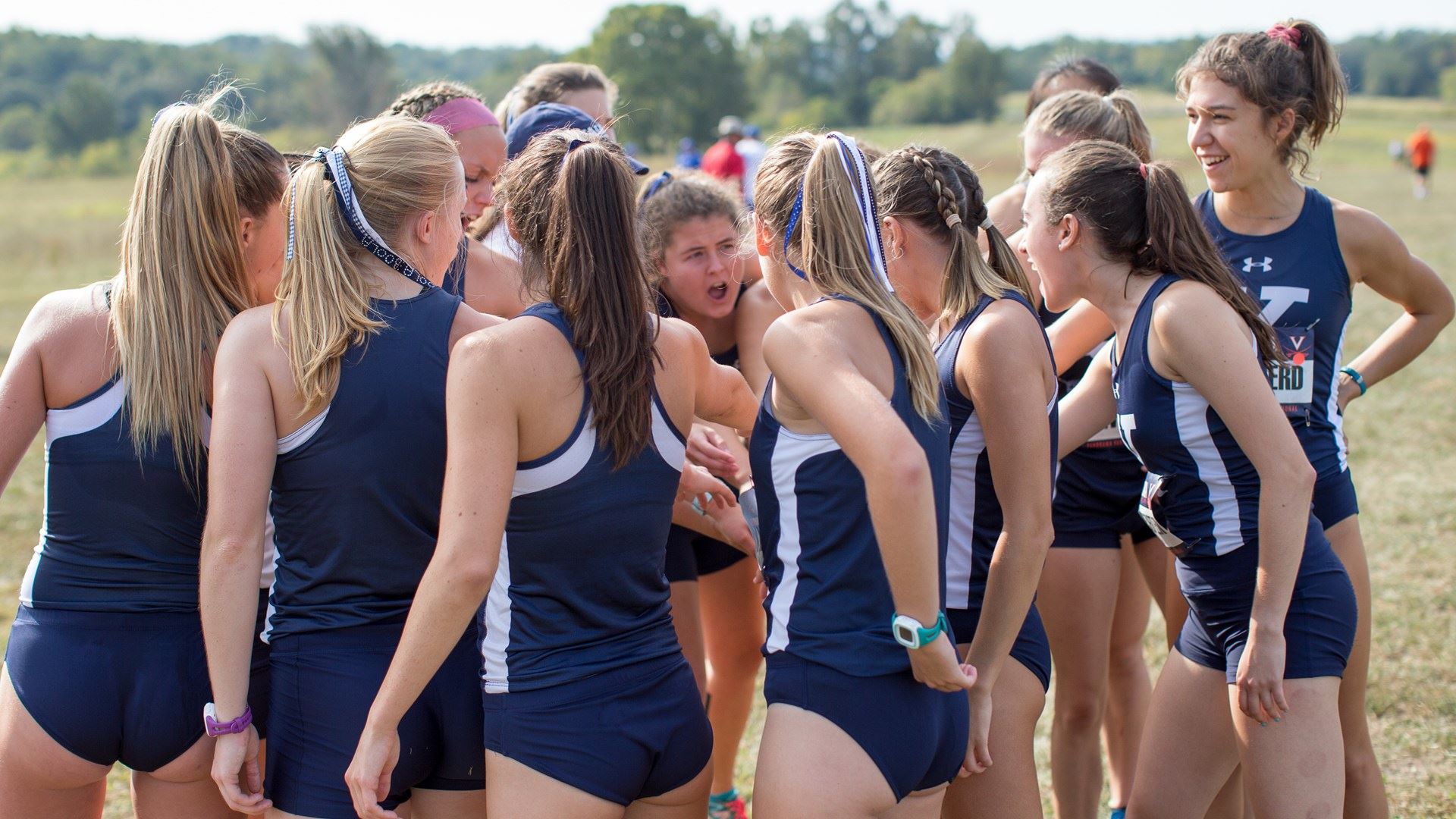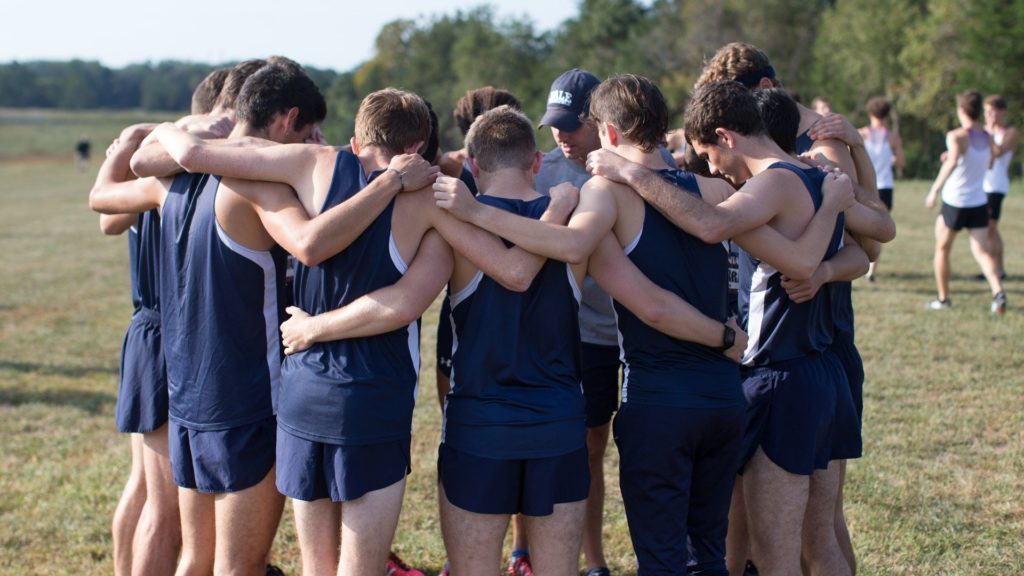CROSS COUNTRY: With no racing season this fall, Bulldogs refocus on the fun of running
Some runners ran mini laps around their college courtyards during the on-campus quarantine, but with Phase II now underway, runners enrolled in-residence have returned to nearly normal training. Strava helps connect teammates far away as they all focus on rediscovering the simple joys of the sport.

Courtesy of Tom Connelly
Without a championship to chase this fall, the men’s and women’s cross country teams are returning to the fundamentals: running for the sake of running.
While other teams have navigated drastic changes in their training routines, the phased return for cross country has been more predictable. The increased hours allotted to Phase II practices have allowed the team to return to a fall schedule similar to previous years, said men’s head coach Paul Harkins and women’s head coach Taryn Sheehan.
Both Harkins and Sheehan emphasized that while the future for competition remains uncertain, they want their athletes to use this time to simply enjoy the process of training.
“Without any races on the schedule, the goal during this time is to listen to our bodies, stay healthy, and, most importantly, enjoy running,” said women’s captain Kayley DeLay ’22. “This semester is about doing what is best for you. For some, that may be following a similar training schedule to past years and crushing workouts, as many of our women are doing now, or it may mean doing fewer miles and opting to take days off for the benefit of our physical and mental health.”
While the restrictions on athletics have affected all teams, cross country’s practice routine has been left somewhat unchanged; even in a typical fall season, almost all of their training happens outdoors. Now that Yale has entered Phase II of the Ivy League’s three-phase plan for resuming athletic training, the team can train two hours a day and six days a week. Sheehan added that her team is doing workouts similar to past years now that Phase II policies permit them to run in groups of 10 or less.
In a regular competition season, the teams would be just weeks away from the Ivy League Heptagonal Cross Country Championships, which occurred Nov. 1 last fall. DeLay’s impressive time of 20:45.6 in the 6-kilometer race won her the title of 2019 Ivy League women’s cross country champion. On the men’s side, Robert Miranda ’22 clinched third place overall. Although Harkins is disappointed not to have a chance to continue the momentum this fall, he views the semester as an opportunity for his athletes to get better and refocus on having fun with running.
“I’ve always had the belief that happy runners make successful runners because they love what they do and they enjoy what they’re doing,” said Harkins. “This is a hard time to be putting in a lot of serious work because you don’t always know what you’re working for. And if you don’t have that full championship that you’re always geared toward, it’s going to be really hard to stay motivated unless you’re actually really enjoying the process.”
The men’s and women’s teams have taken on six and seven first years, respectively. As with all other Yale sports, their integration onto the roster has been starkly different from previous years. While they are not able to participate in normal team bonding activities, like team dinners or full-group runs, the first years and upperclassmen are getting to know each other through small group activities, DeLay said.
For Harkins, the rockiest part of bringing on new first years was the 14-day quarantine upon their arrival. Confined to their residential colleges, some athletes were unable to train at all, while others attempted to keep up their fitness by running mini laps around their college’s courtyard. Both the men’s and women’s first-year groups are now able to train with their teams and have the unique opportunity to settle into a college routine without the pressure of competition.
“This first-year group is phenomenal,” Sheehan said. “They’ve done a great job with the transition, and I’m really excited that they’re getting this period to handle the balance and they don’t have to worry about racing. We’ve spent a lot more time working on those transitional phases than just preparations for races.”

While cross country life on campus may appear to be returning to normal, there are notable absences: runners enrolled remotely. Sophomores away from New Haven and students on fall-term leaves of absence are unable to participate in day-to-day training with their teammates. Both coaches noted that while they check in with athletes to stay connected, they provide very little from a training perspective — remote athletes are mostly in control of their own regimens.
To stay in touch with teammates from far away, many members of the cross country team are posting their workouts on the fitness app Strava. On the Strava feed, they can follow their teammates, see their recent activities — whether running, biking, swimming or yoga — and add comments and photos. DeLay said she uses the app to stay connected to remote teammates and always gives “kudos” for their posts.
“Being away from the team has been a little hard without having the strict regimen of training,” Henry Saul ’24, who is on a leave, said. “There’s just no group to really force you to do hard workouts so it gets tough to motivate yourself sometimes. Strava is so fun; so many people use it and it’s really cool to see how other people train, and it’s motivating for people too.”
Saul, who was a first year with the program last year, is spending the fall in Alaska on a gap semester. When he is not busy with his job at a local bakery, he runs through mountains and trails in Alaska, training with a group of ultra-runners who exercise at high elevations. Teammates can see every run that he logs on the app.
Though spring semester policies for Ivy League athletics are still uncertain, the cross country teams are centered on using this time as a unique opportunity to focus on personal improvement without the looming presence of competition. Normally, these runners are in-season every semester, moving from cross country to indoor track to outdoor track in the spring. This semester, however, Sheehan said they are able to step back and be creative with their training.
“The goal for this fall is to fall in love with this sport with a different perspective,” Sheehan said. “We are in a very unique and really special place in the sense that throughout the pandemic, everybody’s access to facilities and equipment was very different. But for us, all our women needed was a pair of training shoes and to get out the door to run. Now, we’re just focusing on making improvements every day and having fun with it.”
Both teams finished in fifth place at last fall’s Ivy League Heptagonal Championships.
Alessa Kim-Panero | alessa.kim-panero@yale.edu







